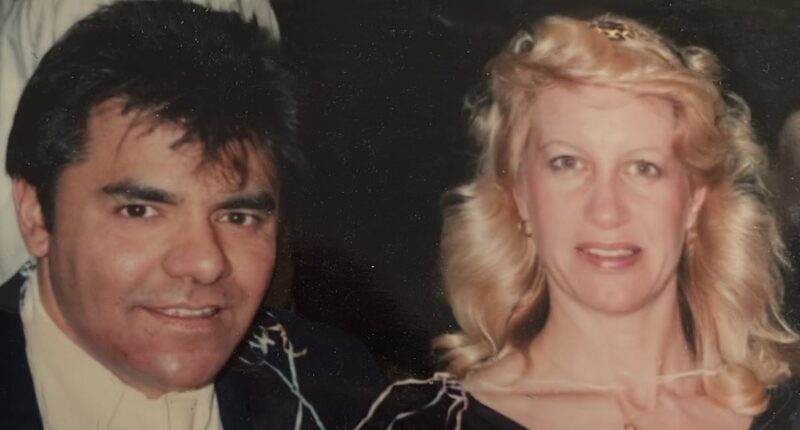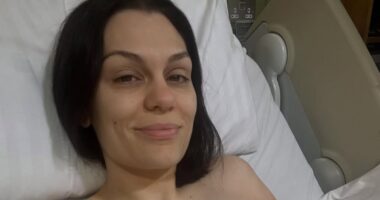To the joggers, dog walkers, and pram pushers, we must have been a familiar sight. Even the seagulls who cruised the sky scanning for discarded sandwich crusts and fish and chip wrappers seemed to know us.
My wife Tressa and I, a middle-aged couple whiling away the afternoon in Royal Victoria Park in Southampton, our favourite place.
Sometimes we’d stop to watch a cruise liner ease itself down the shipping lane. ‘I wonder where it’s going,’ I’d say. ‘The Canaries or the Caribbean? What do you reckon, Tressa?’
Her eyes would leave the skyline and meet mine, briefly, before sliding away silently.
I still saw love in those eyes; to me, they were like the portholes of that boat, gliding past, gateways into Tressa’s faraway mind, which seemed to be slipping further away from me every day.
How much could she see and understand? I’d no idea. While I treasured our walks in the park, they were some of the loneliest times of my life.
Tressa was just 51 when she was diagnosed with posterior cortical atrophy – a rare form of dementia and a cruel one, ultimately robbing people of their ability to walk, talk and see.
It felt especially cruel to be facing this terrible diagnosis at such a young age. Our daughters were just 15 and 13, and we were at that stage in life where we were finally beginning to relax, with the exhausting baby years long behind us.

Kevin with Tressa, who was just 51 when she was diagnosed with posterior cortical atrophy – a rare form of dementia and a cruel one, ultimately robbing people of their ability to walk, talk and see
We were starting to find each other as a couple again and I was falling in love anew with that vibrant blonde who’d stolen my heart all those years ago.
Yet here I was, aged 59, pushing my still-beautiful wife – as I had done for the last four years – through the park in her wheelchair. Chatting and very rarely getting a reply. Zipping up her coat, wiping the raindrops from her face and silently heading for home.
In 1989, I was a 32-year-old bachelor, living in London and working for the BBC, when I decided I wanted to find my ‘one’.
I put an ad in the dating column of a newspaper and, yes, it was corny. I wrote something like ‘handsome man seeks a lady for walks, travel, cinema and going out to lovely places’. But it worked!
I had many responses but only followed up on one. Tressa was a nurse, working in London, ten months older than me and going through a divorce. I was smitten from the start.
I recognised a lady when I saw one. Not only was she beautiful but she was always impeccably dressed, in tailored, smart coats, her hair pushed back in a hairband.
For our first date we went to London Zoo. Tressa explained how her parents had bought her a pony as a child and it left her loving all animals. When we met, she had five cats. She was funny and witty. We fell in love, laughing.
Within 18 months Tressa was expecting our first child; we lived in south London for two years before moving to Southampton, where she was from, to raise our family by the sea.

The happy couple on their wedding day in 1996. They met through a dating column in a newspaper
We married in 1996 and had another daughter. I was working for a housing association in Winchester but outside of office hours my world revolved around Tressa and the girls. Tressa became a full-time mum and she was brilliant at it.
By the time we reached our 40s, we loved spending time together as a family. We’d go on holiday to Center Parcs and visit Tressa’s parents who had a holiday home in Malaga.
If I had to pinpoint the age life got tricky for Tressa, I’d say it was around 48.
The children came home from school one day, complaining that they’d opened their lunchboxes and found them empty. Once again, Tressa had forgotten to put the sandwiches, drinks and snacks inside.
She was mortified, not sure why she had forgotten. A few months later I came home from work to the horrifying sight of firefighters outside.
When Tressa had gone to pick the children up from school, she’d left something cooking in the microwave, which caught fire, causing some smoke damage in the kitchen.
Another time she told me she was popping around to see her mum and taking the children with her in the car. After 20 minutes I noticed the car was still on the forecourt.
I went outside to see what the problem was and she was sitting there with the key in the ignition and the engine running, looking utterly baffled and frightened.
‘I don’t know what’s wrong with me. I can’t remember which pedal is the brake and which one the clutch,’ she said. She didn’t drive again after that.
All of these incidents might raise a red flag for those who understand dementia, but Tressa was only in her late 40s; it just hadn’t crossed my mind.
As for other possible explanations, I didn’t know what the perimenopause was and Tressa was equally perplexed and unable to explain what was happening to her.
We were both politically minded and in 2005, when Tressa was 49, she got involved with the local Lib Dem party, leafleting for our MP Chris Huhne. It was when I saw she’d dumped a load of leaflets outside in the bin that I finally realised something serious was going on.
Her younger sister had been worried for some time and she was the one who took her to the GP and for the subsequent tests to establish what was happening.
After a year of tests we were told by her consultant at Southampton hospital that she had dementia and that Tressa, now aged 51, had just six years to live.
I couldn’t believe it and neither could Tressa. We had a good cry about it together – but only once.
‘Right,’ Tressa said, wiping the tears away. ‘Let’s not talk about this ever again. I want us to enjoy the rest of the time we have left.’
So, after that we just got on with things. We focused on us as a family and doing things with the girls.
We’d visit Victoria Park regularly, always stopping for an ice cream, whatever the weather, or to share a bag of chips with the seagulls.
Tressa took a host of tablets but I’m not sure they did much good because the disease took hold quickly. Some days she’d be there, picking just the right shade of scarf or lipstick to go with her outfit – then I’d find her at a loss over how to do up the buttons on her jacket.
During the first year we were still sleeping together in the marital bed, but I knew we’d soon need to change things in our home.
My sister-in-law oversaw the planning application for an extension and I extended the mortgage to cover it so that we could have a downstairs bedroom with a medical bed that had a hoist over it.

Kevin has now been on his own for the last four years. He says: ‘I didn’t want to think about dating anyone. The problem is Tressa was a real lady and it will be hard to find someone like her again’
The prognosis meant Tressa would eventually lose her ability to walk unaided or do anything for herself, so we also built an en-suite with a walk-in shower. We did this within two years of the diagnosis, thinking we had loads of time, but within a year Tressa needed help with the most basic tasks.
I wanted to keep my wife at home; our teenage daughters were still in school and I wanted them to be able to see their mum – even though by the time she was 55 she could no longer walk. Luckily, while Tressa was at home, she always recognised them.
I probably wasn’t the best father during those years, prioritising Tressa over the girls to my continuing regret and shame.
When I was at work, a team of carers took over, yet the minute I got in, Tressa became my number one focus. Meals were cooked, school uniforms were washed. But was I there for them? Emotionally? Probably not as much as I could have been.
They had their friends but I suppose, for them, their overriding memory of that part of their childhood – and their mother – would be of a roster of carers, coming in and out, and their father distancing himself as he mourned the woman who was being stolen by stealth.
At weekends and during holidays, after I’d got the chores done, I’d take Tressa out in the wheelchair to our favourite park. I’d push her down those familiar paths and sit on the benches, where we’d enjoyed countless ice cream cones and stare out to sea.
‘You’re there, aren’t you Tressa?’ I’d say, taking her hand in mine. ‘I know you are.’
I was adamant that Tressa was too young to go into a home; besides, I’d got myself into a routine of cleaning and dressing her in new bedwear before heading out to work. Then I’d worry all day about whether the carers had turned up on time.
Fortunately, my sister-in-law popped in during the daytime to care for her too, because by 55 my darling Tressa needed round-the-clock care.
I’d get little sleep and have to go to work the next day, worried about the carers doing as good a job as I did. I loved my wife deeply; I knew she was still in there and listening to me.
My bosses were very sympathetic towards my situation, allowing me to start work late and finish late too. As the years passed, Tressa surpassed the doctors’ initial six-year prognosis. I like to think she always recognised me, even though she had lost the ability to speak at 60.
The last time we visited the park together was that same year, in 2016, just before Tressa went into a nursing home. She’d caught an infection and had to be hospitalised. I knew she wouldn’t be coming home again.
From that point, my life took a different routine. I visited Tressa almost every evening after work. I didn’t bring the children every time – by then they were 26 and 24.
Sometimes Tressa would look at me and I could tell she was listening to me. I’d stay with her from 7.30 till 10 most evenings. I never saw friends or had any sort of social life.
On the day Tressa died, aged 64, I received a call at 4am telling me to come to the nursing home. It was the summer of 2020 and I had to mask up because of the pandemic. Tressa was lying in bed with her eyes closed, yet when I called out to her, she opened her eyes and looked at me.
I told her how much I loved her. Her eyes closed again and she took her last breath. I’m utterly convinced she wanted to say goodbye to me before she died. When she had gone, she looked so peaceful. I did take solace in the fact that right to the end, my wife knew my voice.
After Tressa died, I was traumatised. I was 64; today, at 68, I’ve been on my own for the last four years. I didn’t want to think about dating anyone. But I know Tressa would want me to be happy and I’m slowly starting to put myself out there socially.
The problem is Tressa was a real lady and it will be hard to find someone like her again.
She was the best thing that ever happened to me.
- Kevin is donating his fee to Alzheimer’s Research UK.
- As told to: SAMANTHA BRICK















